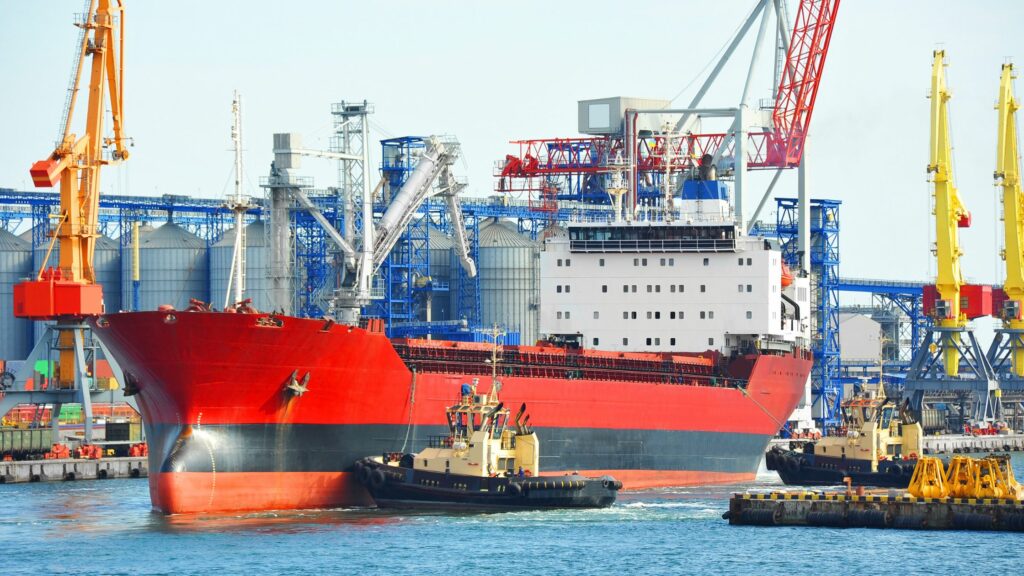Physical Address
304 North Cardinal St.
Dorchester Center, MA 02124

Laycan is often perceived as a technical footnote in the broader narrative of shipping and chartering, overshadowed by more visible aspects such as vessel capacity and freight rates. Yet, it claims its significance through the critical role it plays in streamlining maritime logistics and minimizing costly delays. This period not only marks the schedule for cargo operations but also serves as a safeguard for both shipowners and charterers, ensuring a mutual commitment to timeliness.
This concept distinguishes itself within the shipping industry by offering a framework that balances operational efficiency with contractual flexibility. Key elements of Laycan include the Laydays, marking the onset of this crucial period, and the Cancelling date, signifying its end. Each phase within the Laycan period is vital for the seamless execution of shipping operations, from cargo loading to vessel departure.
Delving deeper, the determination of Laycan involves intricate negotiations and a thorough analysis of logistical variables. These discussions are shaped by factors such as port availability, cargo readiness, and anticipated maritime traffic, each contributing to the finalized Laycan period. The breach of this agreed timeframe carries significant repercussions, including financial penalties and potential renegotiations, underscoring the importance of adherence to the Laycan schedule.
The following sections will further dissect the nuances of Laycan, exploring its impact on demurrage and dispatch calculations, the resolution of disputes, and its influence on shipping contracts and logistics management as per the terms stated in the contract of affreightment (COA). Through this exploration, a clearer understanding of Laycan’s pivotal role in the shipping industry will emerge, highlighting its contribution to the efficiency and reliability of global trade.
Laycan, short for Laydays/Cancelling, represents a critical timeframe in shipping and chartering agreements. It outlines the earliest date when a vessel is permitted to start loading operations (laydays) and the final date by which these operations must begin (cancelling date). This period is pivotal for the efficient coordination of cargo readiness, vessel scheduling, and port operations, serving as a safeguard for both shipowners and charterers to ensure a mutual commitment to timeliness.
The determination of Laycan is the outcome of intricate negotiations between the shipowner and the charterer, designed to ensure a mutual understanding and agreement on a schedule that minimizes the risk of operational delays and the financial burdens they entail. The essence of Laycan goes beyond simple scheduling; it is a testament to the contractual commitment towards timeliness and efficiency in the realm of maritime logistics, serving as a foundational element for reliable and streamlined shipping operations.
The Laycan period is defined by two pivotal dates: the laydays and the cancelling date. These dates are essential in guiding the logistical flow and scheduling of maritime cargo operations, ensuring efficiency and minimizing the risk of delays and associated costs.

Laydays mark the beginning of the window during which the vessel is expected to start its cargo loading operations. This period is crucial for aligning the ship’s arrival, cargo readiness, and port operations. Case Study: Efficient Utilization of Laydays
The cancelling date is the final date by which the loading operations must commence. If the vessel fails to start loading by this deadline, the charterer has the right to cancel the charter party without penalties. Example: Cancelling Date Reached Without Commencement of Cargo Operations
Laycan establishes a precise timeline for cargo loading and unloading, creating a crucial framework for operational efficiency. This clear delineation of start and end dates ensures a shared understanding between shipowner and charterer, facilitating the seamless execution of cargo operations. By setting these specific parameters, Laycan enables the effective coordination and management of cargo handling, ensuring operations proceed smoothly and within the expected timeframe.
The specification of a Laycan period is vital for the effective planning and scheduling of vessel charters. It lays the groundwork for operational planning, including voyage routing, crew assignments, and port visits. This clarity in scheduling allows for the optimization of vessel utilization, ensuring ships are used in the most efficient manner possible.
For example, Global Shipping Ltd. optimized its charter scheduling by effectively negotiating Laycan periods, resulting in a 15% increase in operational efficiency and a reduction in idle vessel time.
Laycan plays a pivotal role in reducing vessel idle time at ports, which can lead to significant financial implications. Waiting times are often accompanied by elevated port fees, increased fuel consumption, and potential penalties for cargo delays. By clearly defining the window for cargo operations, Laycan directly contributes to the reduction of these waiting periods and their associated costs.
| Cost Type | With Adherence to Laycan (USD) | Without Adherence to Laycan (USD) |
|---|---|---|
| Port Fees | 2,000 | 5,000 |
| Demurrage Charges | 0 | 10,000 |
| Additional Fuel Costs | 1,000 | 3,000 |
| Total Costs | 3,000 | 18,000 |

The determination of Laycan is a complex process that involves negotiations between the shipowner and the charterer, taking into account several critical factors such as cargo readiness, port schedules, and maritime traffic conditions. The objective is to establish a mutually agreeable timeframe that ensures the efficient and smooth operation of the charter party agreement. Historical performance data and seasonal variations also play a significant role in these negotiations, providing a data-driven approach to setting the Laycan period.
The establishment of Laycan is primarily based on negotiations between the shipowner and the charterer, where such terms are established in the contract of affreightment (COA). This process is crucial for aligning the interests and requirements of both parties, aiming to determine a timeframe that optimizes the efficiency of cargo operations and meets contractual obligations.
In a recent negotiation between XYZ Shipping (shipowner) and ABC Logistics (charterer), the parties used a strategic approach to agree on a Laycan period.
The shipowner proposed an initial Laycan window based on the vessel’s expected arrival at the port and its subsequent availability for loading. The charterer, considering their cargo readiness and the need for timely delivery, requested adjustments to the proposed dates to align with their logistics schedule. After several rounds of discussions, which included considerations for port congestion and anticipated weather conditions, the parties agreed on a Laycan period that accommodated the shipowner’s operational capabilities and the charterer’s logistical needs, demonstrating the importance of flexibility and collaboration in these negotiations.
The determination of the Laycan period is significantly influenced by the readiness of the cargo, the schedules of the ports involved in the shipping route, and the prevailing maritime traffic conditions. Example of Port Congestion Influence:
During a peak season, the Port of Exampleton experienced significant congestion, affecting the scheduling of cargo operations for multiple vessels, including those chartered by ABC Logistics. To accommodate the congestion, ABC Logistics and XYZ Shipping had to adjust their initially agreed Laycan period.
The adjustment involved extending the Laycan window by three days, allowing for the anticipated delay in port entry and cargo loading. This example highlights the need for flexibility and the importance of considering current maritime traffic conditions when determining Laycan.
Historical performance and seasonal variations are key considerations in setting the Laycan period. Analyzing past shipping operations provides insights into potential logistical challenges and optimal timings, while seasonal factors such as weather conditions and market demands are evaluated for their impact on maritime transport. Case Study on Seasonal Variations:
A study of Laycan periods for the grain shipping route between North America and Europe over the past five years revealed a pattern of adjustments made to accommodate seasonal variations.
During the winter months, Laycan periods were extended to account for potential delays caused by severe weather conditions, while the summer months saw tighter Laycan windows due to more favorable sailing conditions and higher port efficiency. This analysis demonstrates how seasonal variations can significantly affect Laycan periods, emphasizing the need for a data-driven approach in their determination. Incorporating these specifics into the discussion on how Laycan is determined provides a clearer understanding of the complexities and considerations involved in the process, highlighting the importance of negotiations, flexibility, and data analysis in establishing effective Laycan periods.
Breaching the Laycan period has significant implications for both the shipowner and the charterer, leading to a range of contractual and financial consequences. The failure to adhere to the agreed Laycan window can result in penalties, liquidated damages, or even the cancellation of the charter party. These repercussions underscore the importance of meeting the Laycan schedule to avoid disputes and ensure the smooth progression of shipping operations.
Shipowners who arrive late may face penalties designed to compensate the charterer for any logistical disruptions or delays. These penalties are a critical aspect of enforcing the Laycan agreement and ensuring punctuality. Example of Penalty for Late Arrival:
In a recent case, a shipowner was penalized $5,000 per day for arriving three days late to the Port of Exampleville, resulting in a total penalty of $15,000.
This delay disrupted the charterer’s logistics chain, leading to additional costs and operational challenges. The penalty served as compensation for these disruptions, emphasizing the financial and operational repercussions of failing to meet the Laycan schedule.
Failure to commence loading operations within the Laycan window can lead to liquidated damages or demurrage charges, which are fees levied for occupying port space beyond the agreed period. Case of Demurrage Charges:
A vessel’s late arrival led to a demurrage charge of $2,000 per day over a five-day period, totaling $10,000. The charges were applied due to the vessel’s inability to start loading operations on time, causing significant delays and financial implications for the charterer.
If the charterer’s bulk cargo is not ready for loading at the start of the Laycan period, they may be required to compensate the shipowner for the vessel’s idle time. Instance of Compensation for Unprepared Cargo:
A charterer had to pay $3,000 per day for two days of delay in cargo readiness, totaling $6,000 in compensation to the shipowner. This payment covered the shipowner’s losses due to the vessel’s idle time, highlighting the financial consequences of cargo unpreparedness.
A breach of Laycan can lead to the cancellation of the charter party or necessitate a renegotiation of the contractual terms.
Due to a significant delay in vessel arrival, a charter party was canceled, and terms were renegotiated for a new agreement. The renegotiation included a revised Laycan period and adjusted rates to account for the initial breach, demonstrating the potential for contractual adjustments following a Laycan breach.
| Scenario | Penalty/Compensation | Amount (USD) | Outcome |
|---|---|---|---|
| Shipowner Late Arrival | Penalty | 15,000 | Compensated charterer for logistical disruptions |
| Demurrage Charges Applied | Demurrage Charge | 10,000 | Covered extended port occupancy fees |
| Charterer’s Cargo Not Ready | Compensation | 6,000 | Covered shipowner’s losses due to idle time |
| Cancellation & Renegotiation | N/A | N/A | Led to a new charter party agreement |
Disputes regarding Laycan can arise due to various reasons, including delays in vessel arrival, cargo unpreparedness, or unforeseen operational challenges. Such disputes can be effectively addressed through structured mechanisms like arbitration, as outlined in the charter party agreement, or through direct, mutual agreement between the parties involved. These methods ensure that resolutions are achieved efficiently, with minimal impact on shipping operations and the professional relationship between shipowner and charterer.
Arbitration serves as a formal avenue for resolving disputes over Laycan, adhering to the rules and procedures specified in the charter party agreement. This process involves the selection of an impartial arbitration body and the application of the governing law as agreed upon by both parties. Example of Arbitration Resolution:

Resolving disputes through mutual agreement offers a more flexible and often quicker resolution. It allows both parties to negotiate directly and reach a settlement that addresses the interests and concerns of both sides. Example of Resolution Through Mutual Agreement:
The inclusion of Laycan in shipping contracts significantly influences both the operational and financial aspects of maritime transport. It directly impacts demurrage and dispatch calculations, plays a pivotal role in charter party negotiations, and is crucial in determining contract flexibility and penalties. Laycan’s structured timeline for cargo operations provides predictability and contractual security, making it an essential element in the seamless and efficient conduct of maritime logistics.
Laycan periods have a direct influence on demurrage and dispatch calculations, serving as the benchmark for assessing the timeliness of cargo handling. Adherence to Laycan schedules is crucial for optimizing financial outcomes related to these calculations. Examples of Laycan Influence on Demurrage and Dispatch:
Laycan negotiations significantly shape the terms of a charter party agreement, with both parties aiming to establish a Laycan period that accommodates their operational and logistical needs. Case Study on Laycan Negotiations:
In a recent negotiation between a shipowner and a charterer for a container vessel, the initial proposed Laycan period was from June 1st to June 5th. However, considering the charterer’s need for earlier cargo delivery to meet market demands, the parties renegotiated the Laycan to start on May 28th, extending the window to June 3rd.
This adjustment required the shipowner to expedite vessel readiness but also allowed the charterer to capitalize on favorable market conditions. The renegotiated Laycan period was instrumental in finalizing the charter party terms, demonstrating the impact of Laycan negotiations on contractual agreements.
| Case | Laycan Period | Arrival/Loading Date | Demurrage/Dispatch | Amount (USD) | Remarks |
|---|---|---|---|---|---|
| 1 | Mar 1 – Mar 5 | Mar 2 – Mar 4 | Dispatch | 2,000 | Vessel loaded and ready ahead of schedule, dispatch savings claimed |
| 2 | Apr 10 – Apr 15 | Apr 16 | Demurrage | 1,500 | Delay in loading, demurrage charges incurred for 1 day |
Laycan plays a critical role in logistics and supply chain management by enforcing precise coordination among cargo movements, vessel schedules, and port operations. This synchronization is essential for ensuring that cargo loading and unloading activities are aligned with the Laycan timeframe, effectively minimizing delays. Such operational efficiency is vital for maintaining a smooth flow of goods through the supply chain, avoiding disruptions that could lead to increased costs.
Moreover, the influence of Laycan extends to inventory management and just-in-time delivery strategies. Businesses are compelled to refine their inventory turnover and planning practices to accommodate tight Laycan windows, ensuring goods are available precisely when needed, without accruing additional storage expenses. Through its role in dictating the timing of maritime operations, Laycan significantly contributes to optimizing supply chain efficiency and cost control, underscoring its importance in the broader logistics landscape.

Laycan mandates the precise coordination among cargo logistics, vessel scheduling, and port operations. This intricate alignment is essential for ensuring that maritime activities unfold within the defined Laycan period, optimizing the flow of goods and minimizing potential delays. Such coordination is foundational for the smooth execution of shipping operations, highlighting the critical role of Laycan in maritime logistics.
Failure to adhere to Laycan schedules can lead to significant disruptions in supply chains, causing a cascade of inefficiencies and elevated costs. These delays can result in increased storage and demurrage charges, along with possible penalties, emphasizing the importance of timely operations within the Laycan window to uphold supply chain continuity and cost-effectiveness.
The strategic scheduling of Laycan directly impacts inventory management and just-in-time delivery methodologies. By defining precise cargo operation windows, Laycan encourages businesses to refine their inventory control and delivery timing, ensuring goods are managed and distributed efficiently. This approach aids in minimizing storage costs and streamlining supply chain operations, demonstrating Laycan’s influence on logistical efficiency.
Navigating tight Laycan windows necessitates advanced inventory turnover and rigorous planning. Organizations must adeptly manage their stock levels, aligning with the constrained timelines for cargo loading and unloading. This challenge fosters a lean inventory strategy, reducing surplus stock and enhancing supply chain effectiveness.
The ability to efficiently plan and execute inventory management within tight Laycan periods underscores the importance of Laycan in optimizing logistical operations.